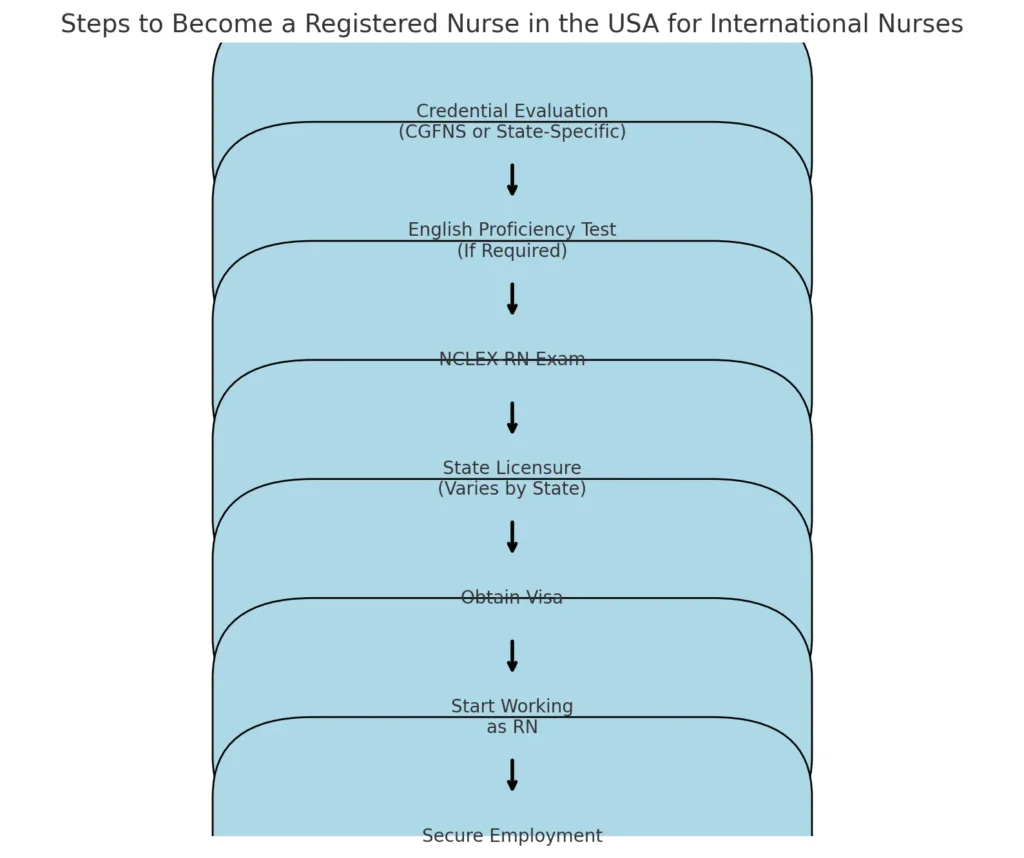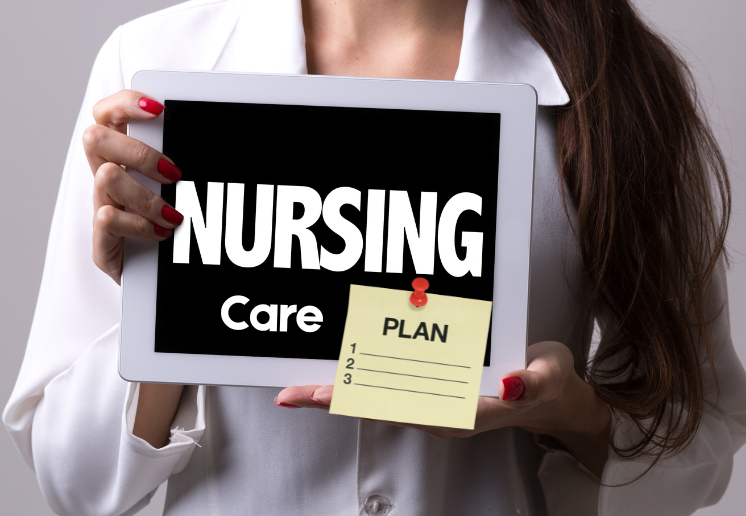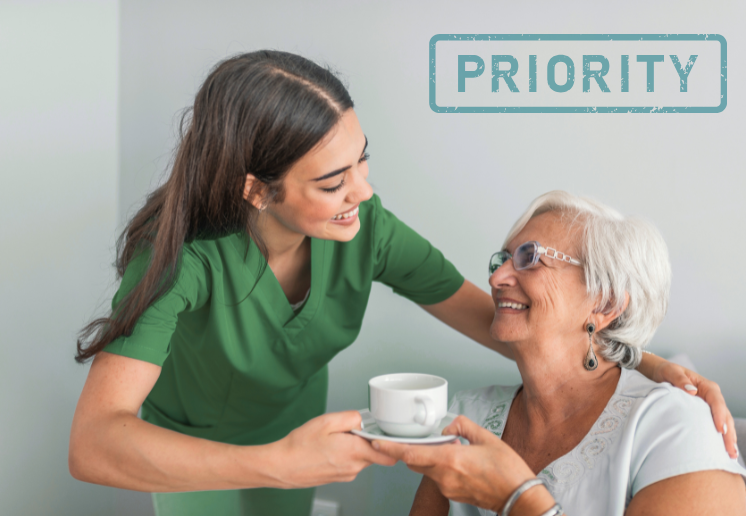Table of Contents
In recent years, the United States of America has become one of the go-to avenues for the aspiring registered nurses. From bustling urban hospitals to serene rural clinics, RNs play a vital role in providing essential medical care to patients across the country.
Now, to become the best registered nurse, there are some key eligibility requirements along with a structured educational and certification process. That’s what I will explain through this blog. Plus, you’ll learn about how FBNPC’s NCLEX program will help you out.
Let’s begin with who a registered nurse is.
Who is a Registered Nurse?
A registered nurse (RN) is a licensed healthcare professional who provides direct patient care. They are responsible for assessing patients’ conditions, developing treatment plans, and administering medications. Plus, they monitor the patients’ vital signs, and educate them and their families about health conditions.
RNs work in a variety of things, including hospitals, clinics, nursing homes, schools, and home health agencies. All in all, they play a crucial role in ensuring the well-being and recovery of patients.
What Do You Need to Become a Registered Nurse in the USA?
For starting on a registered nursing position in the USA, you’ll need to complete the following steps:
- Obtain a nursing degree: You can choose from an Associate Degree in Nursing (ADN), Bachelor of Science in Nursing (BSN), or Direct Entry Master of Science in Nursing (MSN).
- Pass the NCLEX-RN exam: This is a standardized exam that assesses your knowledge and skills as a nurse.
- Obtain a nursing license: Each state has its own licensing requirements, including fees and background checks.
- Gain experience: Once licensed, you can start working in various healthcare settings.
The specific requirements may vary depending on your state and individual circumstances.
What Do the Registered Nurses Do?
RNs play a significant role in the global healthcare system, almost as much as the doctors. They provide direct patient care and are responsible for a key specializations, generally including:
- Patient Assessment: RNs assess patients’ health conditions, including their medical history, symptoms, and vital signs.
- Treatment Planning: They develop and implement treatment plans based on the patient’s needs and in collaboration with other healthcare providers.
- Medication Administration: RNs administer medications as prescribed, ensuring accurate dosage and proper administration techniques.
- Vital Signs Monitoring: They monitor patients’ vital signs, such as blood pressure, heart rate, and respiratory rate, to assess their overall health status.
- Patient Education: RNs educate patients and their families about their condition, treatment options, and self-care measures.
- Coordination with Other Healthcare Providers: They coordinate with doctors, specialists, and other healthcare professionals to ensure continuity of care.
- Documentation: RNs accurately document patient information, including assessments, interventions, and outcomes.
Along with these general responsibilities, RNs have clinical experience in areas like Emergency, Pediatrics, Oncology, and Critical care. No matter the specialization, FBNPC’s licensure programs will be of help.
But what’s the procedure of becoming an RN in the USA? Let’s take a look.
How to Become a Registered Nurse in the US?
If you’re an aspiring RN, in the US, that entails a combination of education, training, and licensure. Here’s a general overview of the steps involved:
Obtain a Nursing Degree
As with any professional career, to become a nurse in the US, the first thing you need to do is obtain a nursing degree from a reputable institute. To that end, there are three main degree options:
Associate Degree in Nursing (ADN)
- Duration: Typically takes 2-3 years to complete.
- Curriculum: Focuses on the fundamentals of nursing, including patient care, medical terminology, pharmacology, and nursing theory.
- Advantages: Shorter duration and lower cost compared to BSN programs.
- Disadvantages: May have limited career advancement opportunities compared to BSN graduates.
Bachelor of Science in Nursing (BSN)
- Duration: Typically takes 4-5 years to complete.
- Curriculum: Builds upon the foundation of ADN programs, incorporating additional courses in liberal arts, sciences, and advanced nursing concepts.
- Advantages: Offers broader career opportunities, including leadership roles and advanced practice nursing specialties.
- Disadvantages: Longer duration and higher cost compared to ADN programs.
Master of Science in Nursing (MSN)
- Duration: Typically takes 3-4 years to complete.
- Curriculum: Combines a BSN curriculum with advanced nursing courses, allowing individuals with a non-nursing bachelor’s degree to earn both a BSN and MSN in an accelerated time frame.
- Advantages: Provides direct entry into advanced practice nursing roles, such as nurse practitioners or clinical nurse specialists.
- Disadvantages: May be more challenging for individuals without a nursing background.
An aspiring registered nurse requires to choose between these programs depending on their goals, learning style, and career aspirations. If you’re unsure which path to take, take a consultation with our experts.
Pass the Nurse Licensing Exam
After you have your nursing degree, you will have to pass the licensure exam. To become a registered nurse in the United States of America, you will have to pass the NCLEX-RN (National Council Licensure Examination for Registered Nurses). It assesses your knowledge and skills as a nurse. Let’s talk about it briefly.
Exam Format
The NCLEX-RN uses a CAT format, which adjusts the difficulty of questions based on your performance. Every right answer means the difficulty increases, and vice-versa. The exam includes a variety of question types, such as multiple-choice, fill-in-the-blank, and case-based scenarios.
Syllabus
Here are four key topics covered in the NCLEX study plan:
- Safe and effective care environment: Includes topics such as infection control, safety, and quality improvement.
- Health promotion and maintenance: Covers areas such as health assessment, health education, and disease prevention.
- Psychosocial integrity: Focuses on mental health, coping mechanisms, and therapeutic communication.
- Physiological integrity: Includes topics such as basic care, physiological adaptation, and pharmacological applications.
You need to use your textbooks, notes, and practice exams before taking the NCLEX exam. Or you can join our NCLEX course and increase the chances.
Get the State Licensure
Once you’ve successfully passed the NCLEX-RN, you’ll need to obtain a nursing license in the state where you plan to practice. Some states have their own licensing requirements and procedures. Here’s what you need to do.
Step 1: Visit the website of the state board of nursing to find specific information about the application process, fees, and continuing education requirements. Prepare copies of your nursing degree, NCLEX-RN results, and any other required documentation.
Step 2: Complete the online or paper application form provided by the state board of nursing. Submit the required application fees.
Step 3: Provide proof of your education, NCLEX-RN results, and any other required documentation.
Step 4: The state board of nursing may conduct a background check to verify your character and suitability for nursing practice.
Once your application is approved and all requirements are met, you’ll receive your nursing license. Then you will be able to practice in the respective state.
Plus, according to the Nurse Licensure Compact (NLC) implemented in 2018, RNs can have a multi-state license. They can practice in 38 states of the US (and counting) in person or through telehealth.
Grow Your Practice (with an Advanced Degree or Specialization)
Once you’ve established yourself as a registered nurse (RN), you may consider pursuing an advanced degree or specialization to enhance your skills. It will help you expand your career opportunities and increase your earning potential.
If you just completed the BSN or ADN, then it might be time to go for masters, i.e. the Master of Science in Nursing (MSN). If you already completed it before obtaining the licensure, go for something like DNP, i.e. Doctorate of Nursing Practice.
DNP is the highest degree available in nursing. It’s often required for advanced practice roles such as nurse practitioners, clinical nurse specialists, or nurse anesthetists.
You can also opt for one or more of the many nursing specialties, like:
- Pediatrics: Focuses on providing care to children and adolescents.
- Geriatric nurse: Specializes in caring for older adults.
- Emergency nursing: Involves providing immediate care to patients with acute illnesses or injuries.
- Oncology: Focuses on caring for patients with cancer.
- Critical care: Provides specialized care to critically ill patients.
- Psychiatric nursing: Specializes in mental health and behavioral health.
- Certified nurse midwife: Provides comprehensive prenatal, childbirth, and postpartum care to women and their families.
- Certified nurse anesthetist: Advanced practice registered nurse (APRN) who specializes in providing anesthesia care.
- Clinical nurse leader: Bridges between the bedside and the administrative levels of healthcare organizations.
- Nurse manager: Oversees the day-to-day operations of a nursing unit or department within a healthcare facility.
Specialization is a key factor in increasing the annual salary for registered nurses. It can also expand the career opportunities and enhance their patient care skills. And after advanced education, you can work in a wide range of nursing avenues. If you need help with becoming the best RN in the US, register yourself and enroll in our NCLEX course.
But what if you are not from the US? What if you are internationally educated in nursing? How do you pursue a career in nursing in the USA then? Let’s find out.
IEN Perspective of Becoming a Registered Nurse in the USA
Let’s say you have completed your nursing graduation from outside the United States; say, India, Nigeria, Nepal, or Pakistan. That means you are an Internationally Educated Nurse (IEN). Then there are a few more things you’ll have to do in addition to the standard process.

Credential Evaluation (CGFNS or State-Specific)
International nurses often need to have their credentials evaluated by organizations like the Commission on Graduates of Foreign Nursing Schools (CGFNS) or state-specific agencies. This evaluation ensures that you have studied at an accredited nursing school and your education and training meet U.S. standards.
However, some US states like New York may not require CGFNS. That allows for a direct credential evaluation through other agencies or the state board of nursing.
You will need to submit your nursing school transcripts, clinical hours, and licensing documents for evaluation.
English Proficiency Test (If Required)
The registered nurses must be able to communicate with their colleagues and patients effectively. So depending on your country of origin and the specific requirements of your nursing program or state, you may need to take an English proficiency test like the Test of English as a Foreign Language (TOEFL) or the International English Language Testing System (IELTS).
Some countries (e.g., India, Nigeria) may be exempt depending on the language of instruction.
NCLEX-RN Exam
All RN candidates in the U.S., including international nurses, must pass the National Council Licensure Examination for Registered Nurses (NCLEX-RN). This exam assesses your knowledge and skills to become a certified nurse.
State Licensure (Varies by State)
Each state has its own RN licensure requirements. You’ll need to apply for a nursing license in the state where you plan to practice and meet any specific criteria, such as completing continuing education courses or undergoing a background check.
Obtain Visa
Depending on your circumstances, you may need to obtain a H-1B work visa or an EB-3 visa (employment-based green card) before working as an RN in the US. Then you can complete your nursing education or a work visa to practice as an RN in the U.S.
For this, you may also need to obtain a VisaScreen certificate. It verifies that your credentials meet U.S. visa requirements.
Start Working as RN
Once you have your nursing license and visa, you can begin searching for nursing jobs and work in the U.S. Networking, online job boards, and reaching out to healthcare facilities can help you find suitable employment.
Secure Employment
Networking with healthcare professionals and applying to job openings are essential steps in securing employment as a registered nurse in the USA.
If you are an internationally-educated nurse trying to be an RN in the USA, get our NCLEX course and prepare for the test in the best way. Depending on your preparation and the US state licensure board’s requirements, you may be able to become an RN in two years or so.
But after you start your nurse career, the learning shouldn’t stop.
What’s Next After Becoming a Registered Nurse in the US?
After you have secured your position as a successful registered nurse, there are several ways forward. But arguably, the best approach would be to go with a post graduation to provide nursing education to future aspirants. That means going for a MSN, or Master of Science in Nursing degree with a focus on Nursing Education.
Most programs take between 16 to 36 months to complete, depending on whether you enroll part-time or full-time. For example, programs like Drexel University’s MSN in Nursing Education can be completed in 24 months. On the other hand, Southern Connecticut State University offers both accelerated (16 months) and part-time (2-3 years) options.
Curriculum
The curriculum typically includes a mix of core nursing courses and specialized education courses. The core nursing courses include:
- Advanced Pharmacology
- Advanced Health Assessment
- Pathophysiology
- Leadership in Nursing Practice
- Healthcare Informatics
And the specialized education courses include:
- Teaching Strategies
- Curriculum Design
- Assessment and Evaluation
- Clinical Practicums
Advantages
- Career Flexibility: Graduates can work in a variety of settings, including universities, simulation centers, and hospital education departments.
- Higher Earning Potential: MSN nurses, including nurse educators, can command higher salaries compared to RNs. Median salaries can range between $86,000 and $129,000.
- Leadership Opportunities: The degree prepares you to lead and innovate in nursing education, influencing the next generation of nurses.
Disadvantages
- Time and Financial Investment: The programs can be expensive, with tuition ranging from $20,000 to over $40,000, depending on the university.
- Less Clinical Focus: If you prefer direct patient care, transitioning to education may mean less time in hands-on nursing practice.
In conclusion, a Master’s in Nursing Education helps you get academic and clinical teaching roles. But it requires significant time and financial investment.
The program is best suited for those passionate about shaping the future of nursing through education.
FAQs on How to become a registered nurse in the USA?
Q.1 How long does it take to become a registered nurse in the USA?
The time it takes to become a registered nurse (RN) in the USA depends on the educational pathway you choose.
Associate Degree in Nursing (ADN): Typically takes 2-3 years.
Bachelor of Science in Nursing (BSN): Typically takes 4-5 years.
Direct Entry Master of Science in Nursing (MSN): Typically takes 3-4 years.
Q.2 What is the fastest way to become a nurse in the US?
The fastest way to get an RN license in the USA is to pursue an Associate Degree in Nursing (ADN). However, keep in mind that BSN programs are becoming increasingly preferred, offering more career advancement opportunities.
Q.3 What is the average salary of a registered nurse in the US?
The average salary for a registered nurse in the US varies depending on factors such as experience, location, and specialty. However, RNs generally earn competitive salaries. The average wages for registered nurses in the US are just under $80K per year.
Q.4 Can a foreigner become a nurse in the USA?
Yes, anyone from around the world can have a career as a nurse in the USA. However, they must meet specific eligibility requirements, including obtaining a student visa, completing a nursing program accredited by the Commission on Collegiate Nursing Education (CCNE), and passing the NCLEX-RN exam.
Q.5 Is nursing a good career in the USA?
Nursing is a rewarding and fulfilling career in the USA. Nurses play a vital role in healthcare, helping patients and their families navigate complex medical situations. With a growing demand for healthcare professionals, BLS projects employment of registered nurses to increase by 6% by 2033. So there’s a stable job market and opportunities for career advancement.
So, What’s the Outlook of Nursing in the United States?
When it comes to registered nursing in the US, the future is beyond promising. In fact, according to the Bureau of Labor Statistics in the US, the demand and employment of registered nurses is projected to grow by 6% by 2033, faster than most other occupations. And as the landscape continues to evolve, the RNs will play a crucial role in high-quality healthcare.
To become the best registered nurse in the US, the process will go from obtaining a nursing degree to passing the state licensures and continuous skills enhancements. Make sure you stay updated on the trends and always seek new opportunities. So, interested in working as a registered nurse in the United States of America? Then let’s have a chat. You can learn how to become a nurse today!



